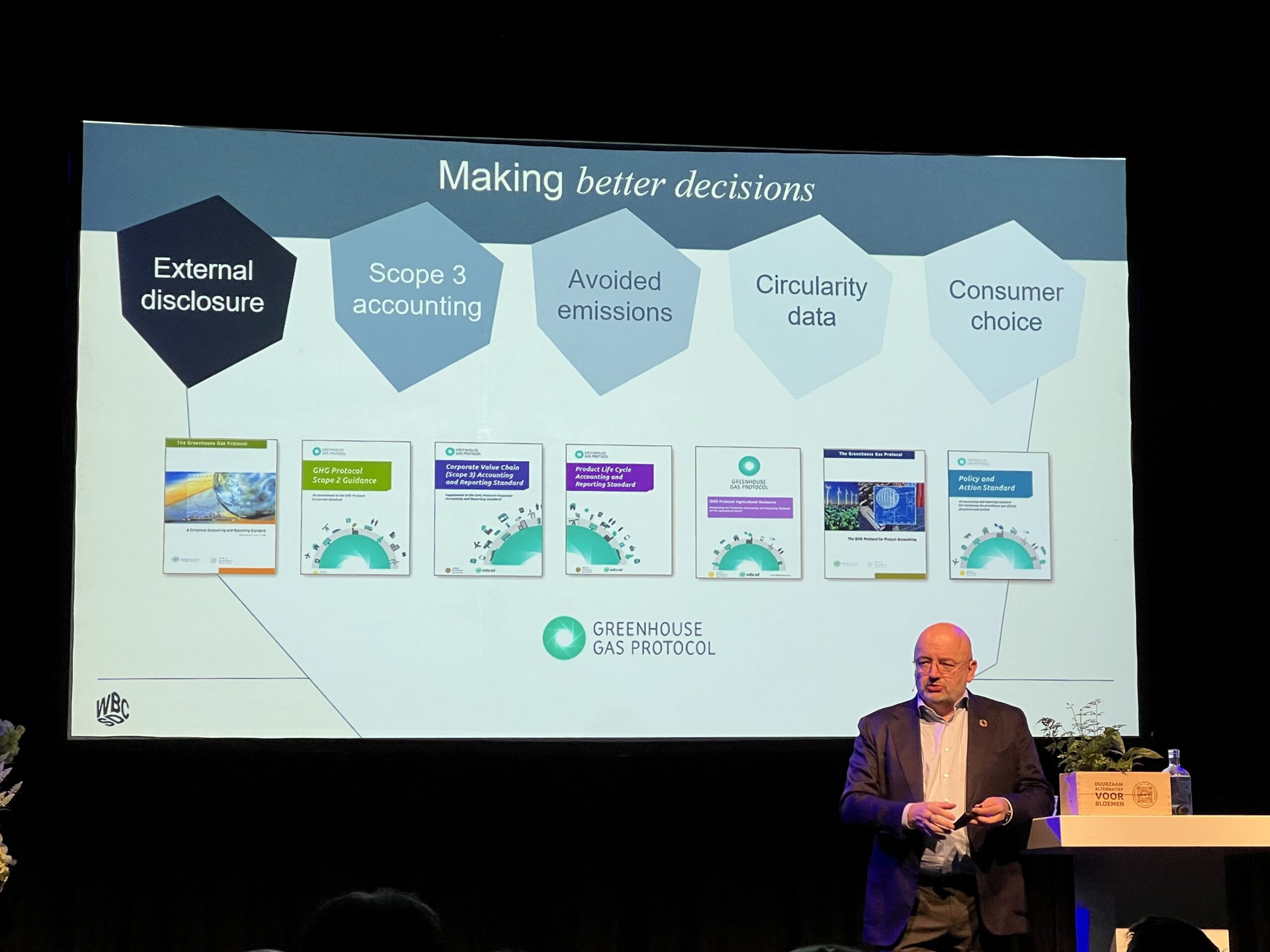Rethinking Prosperity, Responsibility, and Action
On November 14th, the Dutch financial daily FD featured “Climate General” Tom Middendorp stating: “I am ashamed of the depleted world we are leaving behind.” His words reflect a growing discomfort among leaders and citizens as we confront the stark consequences of humanity’s choices on our planet.
A week later, at the National Sustainability Congress, Peter Bakker, President of the World Business Council for Sustainable Development (WBCSD), said: “Creating long-term societal value is the name of the game, and for companies, this will prove to be a life-or-death transition.”This powerful statement holds a dual message: the existential challenge for companies to secure their license to operate and the broader imperative for systemic transformation to sustain human life on Earth.
This layered message invites a profound reflection: how can our frameworks for measuring success, whether personal or corporate, contribute to a world that is whole, unbroken, and sustainable for future generations?
The Path to Wholeness
A response on November 29th from Rabbi Joram Rookmaaker to a question from Professor Paul van der Velde, an expert on Buddhism and Hinduism, added a fascinating dimension to this question. Van der Velde explained that in Buddhism and Hinduism, the world is seen as cyclical: salvation fades over time but is rediscovered by new Buddhas who reawaken the liberating values of earlier teachings. He asked Rabbi Rookmaaker how Judaism views salvation and whether it envisions an ultimate end state.
Rabbi Rookmaaker responded by highlighting the etymological link between the Dutch word “heil” (salvation) and “heel” (whole). In Hebrew, “shalem” (related to shalom) signifies completeness, harmony, and being unbroken. He described the Jewish perspective as one of responsibility: What can we do, between birth and death, to repair the brokenness of the world using our unique talents and qualities? This call-to-action centres on individual and collective accountability for creating a whole, unbroken world.
This reflection raises a critical challenge for our current economic systems: how do we redefine success to prioritize wholeness and sustainability? Our dominant metrics—profits, GDP, shareholder value—often exclude the true costs of environmental degradation, social inequality, and the long-term impacts on future generations. This narrow focus leaves a significant moral and financial debt.

When Prosperity Becomes Loss
It’s increasingly clear that prosperity achieved at the expense of planetary and societal well-being is not true prosperity but a net loss, even when companies report ‘profits’.
Economic growth fuelled by the unsustainable exploitation of resources such as fossil fuels, forests, and water reduces the capacity to meet future needs. Short-term gains often come at the cost of long-term ecosystem stability, food security, and human resilience. Wealth accumulation at the expense of marginalized communities leads to instability, injustice, and conflict, diminishing collective well-being. Industrial activity and overconsumption often result in pollution that harms health and increases costs for future generations.
True prosperity requires ethical accountability to the planet and its inhabitants, prioritizing long-term well-being over short-term gain.
From Reflection to Action
While the urgency for action on sustainability has never been greater, we face significant headwinds. In countries like The Netherlands, the USA, and others, the rise of more populist governments has often led to the rolling back or relaxation of environmental regulations and sustainability commitments.
This political shift undermines progress on the UN Sustainable Development Goals (SDGs) and weakens collective efforts to tackle climate change, social inequality, and resource depletion. Such setbacks can feel like a step backward in the global pursuit of a whole, unbroken world.
At the corporate level, the challenges are equally daunting. Sustainability directors in many companies report increasing burnout as they struggle to advance their agendas within organizations where priorities often remain focused on short-term profits. Their frustration stems from resistance to systemic change, lack of resources, and internal skepticism about the value of sustainability beyond compliance. This challenge is compounded by recent findings from a CFO survey, which revealed that sustainability has become a lower priority for CFOs amidst tightening economic conditions.
For many, the immediate pressures of cost management and shareholder returns are eclipsing the long-term imperative of building sustainable value. Despite these challenges, the need for action remains undeniable. If anything, these obstacles highlight the importance of rethinking how we prioritize and integrate sustainability at every level of decision-making.
Here are some concrete steps businesses, governments and individuals can take to align their actions with the aspiration of creating a whole, unbroken world:
Businesses
Support sustainability leaders: Invest in the well-being and empowerment of sustainability professionals within the organization. Provide them the necessary resources, executive support, and cross-functional teams to drive systemic change.
Adopt new metrics: move beyond profit-driven measures to include broader sustainability indicators, such as true pricing, carbon neutrality, social equity, and stakeholder well-being.
Internalize externalities: quantify and take responsibility for the hidden costs of business activities, such as carbon emissions, social inequality or resource depletion and integrate these into financial planning and reporting.
Stakeholder engagement: collaborate with community organizations, NGOs, and governments to co-create solutions that go beyond regulatory compliance, ensuring meaningful impact that addresses systemic challenges.
Governments
Redefine success: Transition from GDP-based models to frameworks like the Genuine Progress Indicator (GPI) or Doughnut Economics that prioritize societal well-being.
Incentivize sustainable practices: provide tax incentives, subsidies or grants, and regulations that reward sustainable actions and penalize practices that harm the environment or society.
Commit to long-term goals: unlike what we experience currently in The Netherlands, ensure policy continuity and credibility. Resist short-term political pressures that weaken sustainability efforts and instead double down on SDG commitments to recover the lost ground in meeting the target deadlines.
Strengthen public accountability: increase transparency by requiring companies and public institutions to report on their sustainability performance in accessible ways.
Educate and collaborate: raise public awareness and support global cooperation to address shared challenges.
Individuals
Consume consciously: align consumption habits with personal values by prioritizing sustainable, ethical products and supporting companies committed to long-term societal value. Perhaps even importantly, consume less.
Invest in skills for change: learn about sustainability in your field and contribute to community-based solutions.
Advocate for transformation: Use your voice to push for policies and practices that prioritize long-term well-being. Ask for greater sustainability initiatives within your organization, whether through joining SDG committees, influencing decision-makers, or presenting data-driven cases for change.
Demand accountability: Vote for leaders and policies that prioritize sustainability and hold businesses accountable for their impact on the environment and society.
Measuring Progress Toward Wholeness
What gets measured gets done! Success must be redefined not by profit margins but by contributions to a whole, sustainable world. Break away from traditional financial indicators by adopting sustainability-focused metrics that measure progress on environmental, social, and governance (ESG) goals. For CFOs, integrating these metrics can align financial performance with long-term societal value creation. Accountancy bodies, governments, international organizations, industry standards boards, and investor groups all should contribute to a fundamental rethink of our measurement systems.
Periodic self-reflection and evaluation can help track progress:
- How have your actions helped repair broken systems?
- What externalities have you reduced or eliminated?
- Are your decisions increasingly aligned with the goal of long-term societal value?

A Hopeful Path Forward
It’s clear that the journey toward a whole, unbroken world is fraught with challenges, from political resistance to corporate inertia. But these obstacles also present opportunities for innovation and leadership.
As Rabbi Joram Rookmaaker emphasized, repairing the world starts with individual and collective responsibility. Each of us bears responsibility for using our unique talents and qualities to repair the world’s brokenness. For businesses, this means confronting the life-or-death transition Peter Bakker described—not just to secure their license to operate but to align with humanity’s broader license to thrive.
By realigning priorities, supporting change-makers, and integrating wholeness into our economic systems, we can overcome these hurdles.
The aspiration for a whole, unbroken world calls for resilience, creativity, and a willingness to rethink prosperity—not just as financial growth, but as a legacy of integrity and sustainability
The path forward is not easy, but it is deeply inspiring. By rethinking prosperity and aligning actions with the aspiration of wholeness, we can move closer to creating a future that is truly whole, unbroken, and sustainable—for ourselves and for generations to come.
Let’s keep the conversation going. Share your stories and ideas with us, and let’s inspire each other to make a difference!
We can offer you support with both the inner and the outer work through the HeartWork Inner Knowing Journey, the Purpose Driven Impact Journey and deep experience with complex business transformations.
Please let us know what you think, we would love to hear from you via sendlove at heartwork dot earth.

